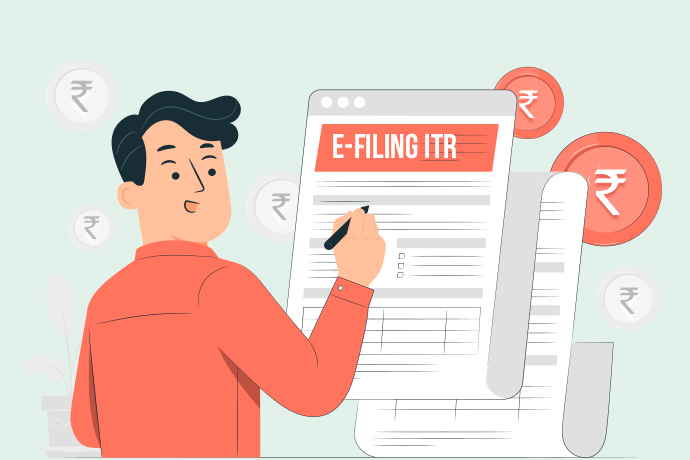


Income Tax Laws are framed by the government and tax is imposed on taxable income of everyone under the categories such as individuals, Hindu Undivided Families (HUF's), companies, firms, LLP, association of persons, body of individuals, local authority and any other artificial juridical person. As per the laws, every individual who qualifies as a resident of India is required to pay tax on his or her income. Every financial year, taxpayers have to file their Income Tax Returns (ITRs) by following some guidelines. This section is an attempt to explain everything related to ITRs
An Income tax return (ITR) is a form where you have to provide information about your income and tax to the Income Tax Department. The amount of tax a taxpayer has to pay is calculated based on his or her income. For example, if the return shows that excess tax has been paid during a year, then the individual is eligible to receive a income tax refund from the Income Tax Department.
According to the income tax laws, an individual or a business has to file the return every year on any income earned during a financial year. The income could be in the form of a salary, business profits, money received from house property or earned through dividends, capital gains, interests or other sources. A specified date is provided for filing the tax returns and individuals and businesses have to submit it before that specified date. If a taxpayer misses the deadline, he or she has to pay a penalty.
As per Indian tax laws, it is mandatory to file your income tax returns if your income is more than the basic exemption limit. The income tax rate is pre-decided for taxpayers and any delay in filing returns will lead to paying late filing fees and can also affect your chances of getting a loan or a visa for travel purposes.
Here are all the relevant documents handy before you start your e-filing process.
The following forms are to be taken into consideration when filing returns as per the government of India:

Electronic filing or popularly called e-filing is a method that involves submitting tax returns online. This is done using a tax preparation software that has been approved by Income Tax Department of India. This online system has several benefits and it has become very popular as well. It allows the taxpayer to file a tax return from his or her home, at any convenient time, during a specific period in a financial year.
Visit the e-filing website https://www.incometax.gov.in/iec/foportal
2: Register or Login to e-file your returns
• In case you are already registered, click on the ‘Login’ button.
• In case you have not registered yourself on the portal, click on the ‘Register’ button.
3: Click on ‘Taxpayer’ and enter your PAN card details and click on ‘validate’.
4: Provide details such as your name, address, gender, residential status, date of birth, etc. Then give details of your email ID and registered mobile number.
5: Once the form has been filled up, click on ‘Continue’.
6: You will get a 6-digit One Time Password (OTP) on your registered mobile number and Email address.
7: Enter the OTP, follow the instructions and complete the registration process.
8: The final step will be set up a password and secure login message.
1: Visit https://eportal.incometax.gov.in/iec/foservices/#
2: Once you have logged in, click on the tab ‘e-file’ and then click on ‘File Income Tax Return’.
3: Select the Assessment year for which you wish to file your income tax returns.
4: You will be to choose if you want to file your returns online or offline. In this case you need to choose the former.
5: Choose whether you wish to file your income tax returns as an individual, Hindu Undivided Family (HUF), or others. Choose the option ‘individual’.
6: Select the income tax returns (ITR) you wish to file and accordingly select the form according to the category you belong to. For example, ITR 2 can be filed by individuals and HUFs who don’t have income from business or profession.
7: In the next step, they will ask you the reason for filing your returns. Make sure you choose the right option.
8: Fill in your bank account details. If you have already provided the details of your bank account, then pre-validate it.
9: You will then be directed to a new page to file your income tax returns. The page will contain already filled information. Check them make sure all the details mentioned are correct. Confirm the summary of your returns and validate it.
10: The last step is to verify your returns and send a hard copy of it to the Income Tax Department. The verification process is mandatory.
Disclaimer:This section provides general information and discussions about tax and related subjects. The information and other content provided in this blog, website or in any linked materials are not intended and should not be considered, or used as a substitute for, expert opinion or a law. Kindly contact an expert for tax-related queries. ^^Subject to changes in tax laws.
Source: Income Tax Department, Government of India
Visit www.incometaxindiaefiling.gov.in to file your income tax return. Filing ITR is simple and it also has an instructional guide for those who find it difficult, thereby making it even easier.
You may have to pay additional interest, penalties, or may face legal action. As per the amount of tax that must be paid, the prosecution will vary.
You can reach out on the helpline number 180042500025, in case you have any questions or queries when filing your returns online.